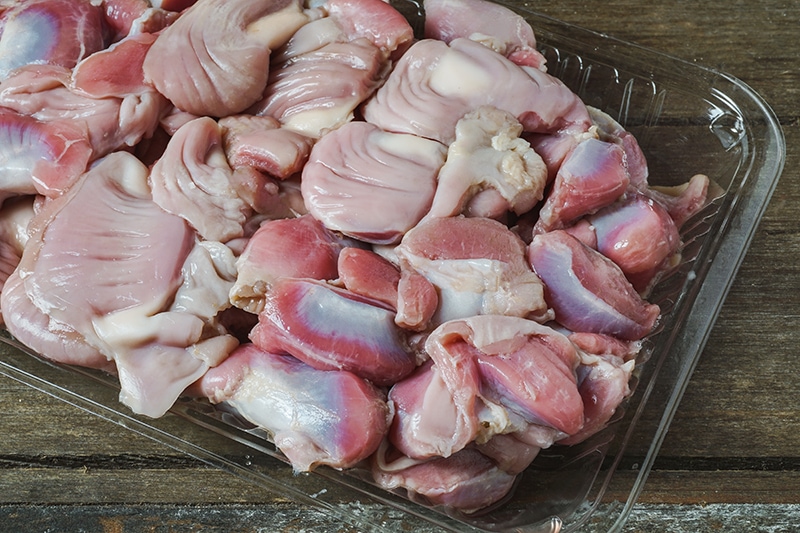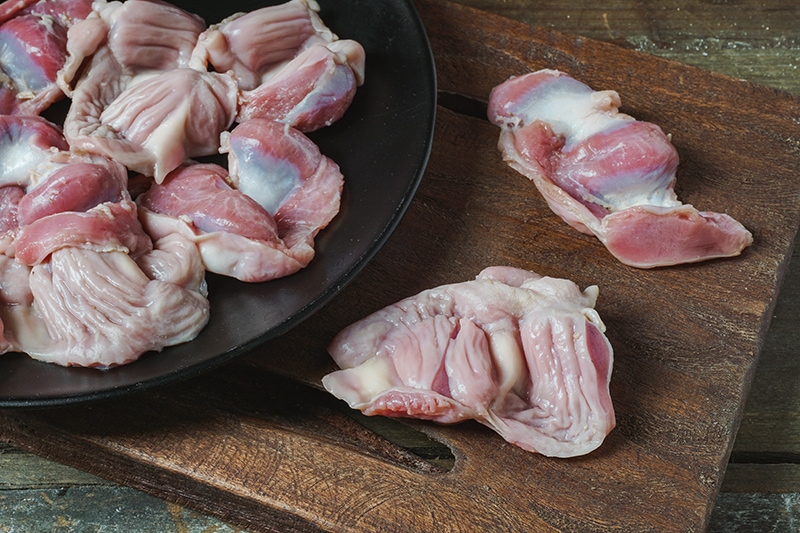Dogs can eat chicken, but can dogs eat chicken gizzards? Yes, you can feed your dog chicken gizzards! Of course, as with any food, there are potential risks to feeding your dog chicken gizzards. However, these risks can be largely avoided by ensuring you are properly feeding chicken gizzards to your dog. To learn more about the benefits of chicken gizzards and how to prepare them for your dog, keep reading below.
What Nutrition Do Chicken Gizzards Provide?
The chicken gizzard is a muscle that is part of the chicken’s digestive system. This muscle contracts to grind up a chicken’s food before passing it along to the rest of the digestive system. Interestingly, chicken gizzards cannot properly grind up food without the presence of small pebbles and other debris.
Since the chicken gizzard does a lot of work, the muscle tends to be tough and chewy. This can be a fun texture for dogs in safe, small bites. Even better, chicken gizzards can provide plenty of beneficial nutrients.
Chicken gizzards are a great source of lean protein. A 4-ounce serving contains around 26 grams of protein. While your dog shouldn’t need protein supplements, as his regular food should provide all his daily nutritional requirements, it is nice to know that chicken gizzards are a good source of healthy protein.
Chicken gizzards contain B vitamins,1 such as niacin, riboflavin, thiamin, and vitamin B6. Additionally, they are an excellent source of phosphorus, iron, and zinc. As an added bonus, chicken gizzards are low in fat and calories, so you don’t have to worry about your dog munching on these as an occasional treat.

How to Properly Clean Chicken Gizzards
If you have purchased chicken gizzards from the store, the chances are likely that they’ve already been cleaned. If you haven’t, you must clean them before feeding them to your dog. Since the chickens require pebbles, dirt, and other debris to grind their food within the gizzard, unwashed chicken gizzards still contain this grime.
Thankfully, chicken gizzards contain a pouch that houses all the debris inside, making it easy to remove and clean. When cleaning the chicken gizzards, it is important to avoid puncturing the pouch. If punctured, the grime inside of the pouch will enter the rest of the chicken gizzard and cause it to become soiled. Spoiled chicken gizzards are not good for eating, as they will smell foul and may contain harmful organisms.
To clean chicken gizzards, cut along the length until your knife lands on a touch membrane. Cut slowly until you see something that is yellow, green, or gray in color. That is the pouch. Grip both slices of the chicken gizzard and pull to expose the rest of the pouch. Once exposed, remove it carefully. Toss out the pouch and rinse out the chicken gizzard.

How to Prepare Chicken Gizzards for Your Dog
When cooking chicken gizzards, it is important to ensure that they are cooked all the way through to avoid any food-borne illnesses. Do not feed your dog raw chicken gizzards since they may contain Salmonella or E. coli, which can make your dog very ill.
Boiling chicken is a good way to serve it to your dog. When preparing it, do not add any ingredients to the chicken gizzards. In fact, some vegetables can be incredibly dangerous for dogs, such as garlic or onions.2
What Is the Right Amount of Chicken Gizzards to Feed Your Dog?
Moderation is a key component to ensuring your dog is healthy. While chicken gizzards provide plenty of nutritional benefits, they should only be offered occasionally.
The size of your dog will play a huge role in determining the ideal portion of chicken gizzards.
| Dog Size | Amount of Chicken Gizzards |
| 2–20 pounds | 1 tablespoon |
| 21–30 pounds | 2 tablespoons |
| 31–50 pounds | Up to ¼ cup |
| 51–90 pounds | ⅓ cup |
| 91+ pounds | ½ cup |
Source: https://www.petmd.com/dog/nutrition/can-dogs-eat-chicken
These numbers are estimates only and may not be appropriate for every dog. To determine what is right for your dog, consult your vet.
PangoVet. It’s an online service where you can <b>talk to a vet online</b> and get the personalized advice you need for your pet — all at an affordable price!
</p>
<div class="su-button-center"><a href=https://www.dogster.com/dog-nutrition/"https://pangovet.com/?utm_source=dogster&utm_medium=article&utm_campaign=dog_eat_drink%22 class="su-button su-button-style-default" style="color:#FFFFFF;background-color:#FF6600;border-color:#cc5200;border-radius:9px;-moz-border-radius:9px;-webkit-border-radius:9px" target="_blank" rel="nofollow"><span style="color:#FFFFFF;padding:0px 24px;font-size:18px;line-height:36px;border-color:#ff944d;border-radius:9px;-moz-border-radius:9px;-webkit-border-radius:9px;text-shadow:none;-moz-text-shadow:none;-webkit-text-shadow:none"> Click to Speak With a Vet</span></a></div></div></div>"}" data-sheets-userformat="{"2":513,"3":{"1":0},"12":0}"> If you need to speak with a vet but can’t get to one, head over to PangoVet. It’s an online service where you can talk to a vet online and get the personalized advice you need for your pet — all at an affordable price!

How to Know if Your Dog Is Allergic to Chicken
Before feeding your dog chicken gizzards, you must verify that he is not allergic to chicken. Protein sources (including chicken) are among the most common sources of allergies in dogs. Consult your vet before feeding chicken gizzards to your dog, then give your dog a small portion and monitor his response.
If your dog displays adverse signs after eating chicken, chicken gizzards are not the treat for him. Signs that your dog may be experiencing an allergic reaction to his food include:
- Redness of the skin
- Excessive itching
- Rashes or hives
- Loss of hair
- Skin infections (including hot spots)
- Ear infections
If you believe your dog is allergic to chicken, talk to your vet about hypoallergenic or limited-ingredient diets. However, food allergies only account for a small percentage of allergic skin disease in dogs.
Final Thoughts
Chicken gizzards are good for your dog as a treat since they contain plenty of protein and other beneficial nutrients. While store-bought chicken gizzards will likely already be cleaned, you must remove the pouch full of debris before you cook and feed them to your dog. In moderation, chicken gizzards make an excellent treat for your dog.
See also:
- Can Dogs Eat Rotisserie Chicken? Vet-Approved Benefits, Risks, & FAQ
- Can Dogs Eat Clover? Vet-Reviewed Facts & FAQ
Featured Image Credit: SurianiSuzie, Shutterstock













